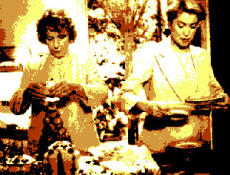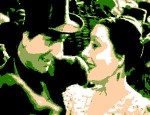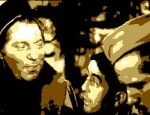Film Review

In the second of her collaborations with André Téchiné (after the equally compelling Hôtel des Amériques, 1981), Catherine Deneuve is perfectly suited for the lead role and, visibly at home in the part, turns in one of her finest performances. The untimely death of the actress's former lover, François Truffaut in October 1984, had come as a shock and was a factor in her decision to take a year-long break from acting. On her return to cinema in 1986, Deneuve seems to have acquired a greater maturity and appears better equipped to take on more difficult roles, such as the ones Téchiné would consistently write for her over the following decades. The most important element of Le Lieu du crime is the fraught relationship between the emotionally repressed mother, Lili (Deneuve), and her totally mixed up 13-year-old son Thomas (Nicolas Giraudi). Both characters seem incapable of expressing their true feelings for one another and appear afraid, if not resentful, of the intense bond that connects them. Beautifully restrained performances from both actors make this the essential dark core of the drama, around which the other narrative elements are elegantly draped, like fine robes on a decomposing corpse.
Le Lieu du crime may well have been written to showcase the talents of Catherine Deneuve, or at least give her the opportunity to prove herself as a serious dramatic actress, but it is a well-constructed drama that owes as much to its plethora of interesting, well-developed secondary characters. The admirable supporting cast includes Danielle Darrieux (once again happy to play Deneuve's dowdy mother), Victor Lanoux, Claire Nebout and a strikingly photogenic Wadeck Stanczak. Téchiné was assisted on his screenwriting by Pascal Bonitzer and Olivier Assayas, who would become important auteur filmmakers in their own right, and such is the quality of the script that every character in the film is convincing and darkly fascinating.
Whilst not strictly a film noir, Le Lieu du crime does borrow a pivotal noir device, the notion of entrapment, which is marvellously evoked by the constantly roving camera which seems to imprison the characters in their unfulfilled lives. There is not a character in the film who is not cruelly confined by circumstances beyond his or her control. Martin - the escaped convict to whom Deneuve's character, Lili, is inexplicably drawn - swaps a physical prison cell for a psychological one, as he becomes racked by guilt for murdering his accomplice. Try as she might, Lili cannot tear herself away from the ex-husband who still dotes on her and languishes in an emotional prison. Thomas, the neglected son, has come to regard his boarding school as a prison which he fantasises will one day be blown up.
Only Lili's elderly mother (Darrieux) seems willing to accept the sham order of her existence, but there is something intensely tragic about her attempts to hold the family unit together with fancy cuisine and freshly picked cherries. In the memorable post-Communion dinner scene, the camera spins around the family members like a sorceress attempting to bind them together with invisible threads - in vain. Order is achieved only after the storm has broken, when the protagonists have been set free and are able to embrace a life founded on truer instincts than flawed middleclass morality. But, even then, you can't help wondering if they are about to exchange one prison for another. Freedom is, sad to say, the greatest illusion of all.
© James Travers 2013
The above content is owned by frenchfilms.org and must not be copied.
Film Synopsis
In rural France, a 13 year old boy, Thomas, runs into an escaped convict who orders him to return with some money. Thomas is on holiday from the boarding school he loathes and is staying with his mother Lili after her recent divorce from his father Maurice. After an awkward encounter with his mother, Thomas manages to extort some money from his grandfather and fearfully returns to the convict. This time, the latter, a young man named Luc, is not alone - and his accomplice wants to kill the boy. Luc saves Thomas by killing his partner. Later, Luc strays into the riverside bar run by Thomas's mother and immediately attracts her attention. Lili finds Luc a hotel where he can spend the night and quickly realises that she has fallen in love with him. Unfortunately, Luc's former girlfriend Alice soon appears on the scene...© James Travers
The above content is owned by frenchfilms.org and must not be copied.
Similar Films
Here are some other films you may enjoy watching:- L'Humanité (1999)
- Après la vie (2002)
- To Kill a Mockingbird (1962)
- Mean Streets (1973)
- Contre-enquête (2007)
Other related links:
Film Credits
- Director: André Téchiné
- Script: André Téchiné, Pascal Bonitzer, Olivier Assayas
- Cinematographer: Pascal Marti
- Music: Philippe Sarde
- Cast: Catherine Deneuve (Lili Ravenel), Danielle Darrieux (La grand-mère), Wadeck Stanczak (Martin), Nicolas Giraudi (Thomas), Jean-Claude Adelin (Luc), Jean Bousquet (Le grand-père), Michel Grimaud (Roger, le serveur), Philippe Landoulsi (L'inspecteur), Claire Nebout (Alice), Jacques Nolot (Le Père Sorbier), Victor Lanoux (Maurice), Christine Paolini (Suzan)
- Country: France
- Language: French
- Support: Color
- Runtime: 90 min
- Aka: Scene of the Crime
The greatest French Films of all time

The Golden Age of French cinema

The very best sci-fi movies
